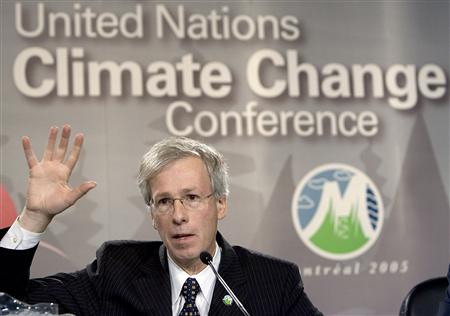November 29, 2005
Global warming talks eye U.S.

Stephane Dion, Canada's environmental minister and newly elected president of the United Nations Climate Change Conference speaks during a news conference following opening ceremonies in Montreal November 28, 2005 . REUTERS/Christinne Muschi
By Alister Doyle, Environment Correspondent
MONTREAL (Reuters) - Host Canada urged a wider fight against global warming at the start of 189-country talks on Monday that will try to enlist the United States and poor nations in U.N.-led schemes to fight climate change beyond 2012.
"Let us set our sights on a more effective, more inclusive long-term approach to climate change," Canadian Environment Minister Stephane Dion told the opening of the U.N. conference in Montreal, which lasts until December 9.
"More action is required now," Dion told delegates at the talks, likely to involve up to 10,000 representatives of governments, environmental groups and businesses, charged with working out how to limit emissions of heat-trapping gases from fossil fuels.
The talks will start mapping out what to do after the U.N.'s Kyoto Protocol, a first step by about 40 industrial nations to curb emissions, runs out in 2012. Negotiations on a successor could take several years.
The Montreal session included actors and video images showing the risks of a changing climate -- including more frequent hurricanes, ice storms, desertification, locust swarms, forest fires, floods and melting ice caps.
Dion said climate change was the single most important environmental issue facing the world today.
He did not mention Washington by name but the United States, the world's biggest polluter, and Australia have pulled out of Kyoto, denouncing its caps on emissions as an economic straitjacket.
CAPS WON'T WORK
"A targets and timetables approach will not work for us," chief U.S. climate negotiator Harlan Watson told Reuters, reiterating the Bush administration's opposition to Kyoto-style caps.
Washington favors an approach with big investments in new technologies like hydrogen or research into burying carbon dioxide, the main industrial gas blamed for warming the planet.
"We are working hard on some of the advanced technologies ... but the development and deployment of technology does not fit with rigid targets and timetables," said Watson.
Apart from the United States and Australia, Kyoto excludes poor nations, such as China and India, from the first set of targets. Their emissions are growing but far lower per capita than those of industrial nations.
"We have an enormous task in front of us," said Argentine Environment Minister Gines Gonzalez Garcia.
He said big nations should take the lead and "significantly reduce" their emissions. Kyoto backers are supposed to cut their emissions by 5.2 percent below 1990 levels by 2008-2012.
Some delegates noted that U.S. President George W. Bush signed a declaration at the Group of Eight summit in Scotland in July promising action at the U.N. talks in Canada.
Referring to Montreal, the G8 leaders said: "We are committed to move forward in that forum the global discussion on long-term cooperative action to address climate change."
Since records began in the 1860s, the 10 hottest years have been since 1990 and most scientists blame rising temperatures on a build-up of greenhouse gases from carbon dioxide released by burning fossil fuels in power plants, factories and cars.
Dion is due to stay on as president of the talks although Canada's Liberal government is likely to be toppled in a confidence vote on Monday, which would trigger an election.
The meeting is a parallel session of the 156 nations which have ratified Kyoto and a total of 189 countries, including the United States, which back the wider U.N. climate convention.
